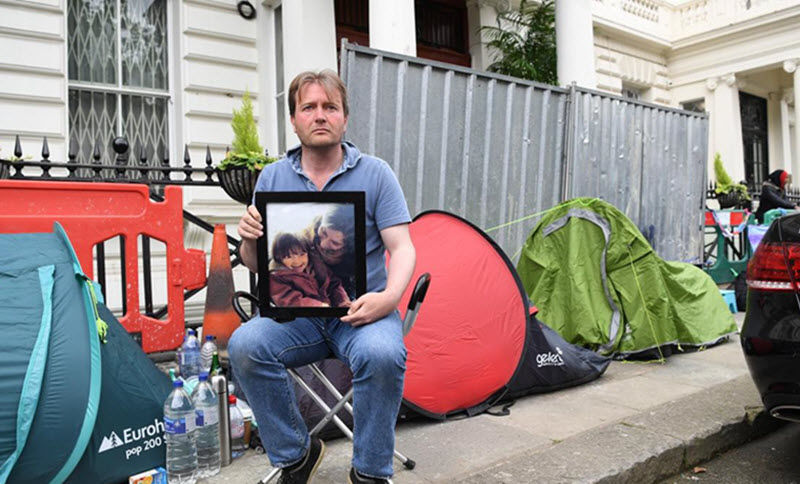

by Navid Felker
A British-Iranian dual citizen and her British husband began a joint hunger strike this week to demand her unconditional release from an Iranian prison. The timing is dangerous, as the relationship between the two nations has grown increasingly strained.
On Saturday, Nazanin Zaghari-Ratcliffe and her husband, Richard Ratcliffe, began their campaign. Mr. Ratcliffe set up a small campsite in central London on the sidewalk outside the Iranian Embassy. While embassy staff members erected metal barricades between his tent and the front door, and intermittently sanded the railings behind him, he remained.
In an interview on Tuesday evening he said, “Being here is meant to be a very visible presence to say, ‘This is unacceptable, you are holding an innocent person.” He added, “They have effectively kidnapped my wife.” He also said that he hadn’t eaten in four days.
Ms. Zaghari-Ratcliffe was detained in a Tehran airport in 2016 as she tried to return home to Britain after visiting family with the couple’s daughter, Gabriella. She was accused of plotting to overthrow Iran’s government and ultimately sentenced to five years in prison.
She remains behind bars, despite British attempts to intervene, and the United Nations urging her release. Boris Johnson, then the British foreign secretary and now a leading candidate to be Britain’s next prime minister, erroneously told Parliament in November 2017 that Mrs. Zaghari-Ratcliffe was in Iran “simply teaching people journalism.” His statement was used in a subsequent court hearing as evidence that she had engaged in “propaganda against the regime.”
This hunger strike is the first time her husband has joined her in the action, and is timed to coincide with their daughter, Gabriella’s, fifth birthday. The little girl has remained with family in Iran pending her mother’s release, because her British passport was taken when her mother was detained.
“I am sitting here to make the point that we need to sort this out,” Ratcliffe said. Meanwhile, the Iranian embassy has not agreed to meet with Mr. Ratcliffe to discuss his wife’s case. “They have not even been willing to open the door to explain what they are doing and why they are doing it, and what has been going on,” he said. “It’s shameful.”
He said he hopes to change perception with his protest. “You cannot want to look at us, you can pretend to look away, but it’s a lot quicker to start trying to solve this problem,” he said.
Representatives from Amnesty International and other supporters have joined Mr. Ratcliffe in his campaign. But, the Iranian Embassy did not respond to a request for comment about Mr. Ratcliffe’s campaign.
On Twitter this week, Hamid Baeidinejad, the Iranian ambassador to Britain, posted: “Entrance and the pavement are the essential parts of the Iran Embassy building and needs to be cleared of persons and media to ensure security and peace of mind for diplomats entering the Embassy.” And in Farsi, he posted, that “traffic from the main door is almost impossible” because of the protest and it “undermines the security” the embassy.
Jeremy Hunt, Britain’s foreign secretary, met with Mr. Ratcliffe on Saturday. He posted a message on Twitter to Iran, demanding the country do the right thing and release Ms. Zaghari-Ratcliffe from prison. Mr. Ratcliffe said Mr. Hunt has remained personally committed to the case.
In March, Mr. Hunt said that despite his office’s best efforts to secure her release, Iranian authorities had not been responsive to repeated requests. He took the “extremely unusual” step, as he put it, of giving Ms. Zaghari-Ratcliffe diplomatic protection, which elevated her case to a formal state-to-state issue. Iran quickly denied that she was entitled to the status and said it did not consider her case a diplomatic issue.
The relationship between Iran and Britain has become increasingly strained in recent weeks, as Iran threatens to end compliance with the 2015 nuclear deal and Britain shows its willingness to impose sanctions if the deal is violated.
Mr. Ratcliffe said he believed his wife’s case should be addressed immediately and said Iran’s recent release of Nizar Zakka, a Lebanese permanent resident of the United States who was jailed for four years, gave him hope. His mother, Barbara Ratcliffe, joined him on Tuesday at the embassy. She said she spoke with her daughter-in-law on Sunday and described Ms. Zaghari-Ratcliffe as emotionally fragile. Mrs. Ratcliffe said further that she never imagined something like this would happen to her daughter-in-law. “I was so jolly naïve I didn’t realize things like this happened,” she said, “What has Naz done but gone with her baby to visit her mom and dad? If that’s a crime, well, that’s ludicrous.”







